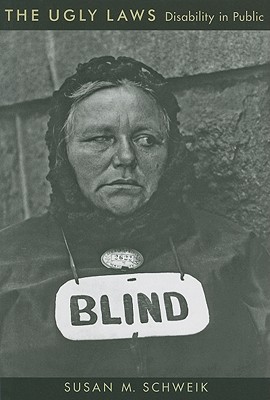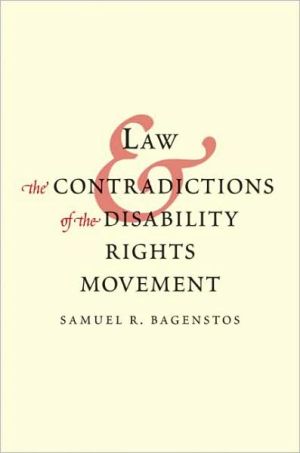The Ugly Laws: Disability in Public
Search in google:
In the late-nineteenth and early-twentieth centuries, municipallaws targeting "unsightly beggars" sprang up in cities across America. Seeming to criminalize disability and thus offering a visceral example of discrimination, these "ugly laws" have become a sort of shorthand for oppression in disability studies, law, and the arts.In this watershed study of the ugly laws, Susan M. Schweik uncovers the murky history behind the laws, situating the varied legislation in its historical context and exploring in detail what the laws meant. Illustrating how the laws join the history of the disabled and the poor, Schweik not only gives the reader a deeper understanding of the ugly laws and the cities where they were generated, she locates the laws at a crucial intersection of evolving and unstable concepts of race, nation, sex, class, and gender. Moreover, she explores the history of resistance to the ordinances, using the often harrowing life stories of those most affected by their passage. Moving to the laws' more recent history, Schweik analyzes the shifting cultural memory of the ugly laws, examining how they have been used—and misused—by academics, activists, artists, lawyers, and legislators.Drawing from a huge range of cultural materials, from police reports and court dockets to popular fiction and reformist exposés, Schweik rewrites an urban legend about disability into a meticulously researched and powerfully reasoned argument about law, politics, and cultural aesthetics. Building a case in ever expanding circles until she is in a position to rethink large swaths of United States culture through the lens of the ugly laws, Schweikcasts a bright light on the conditions of disability at the turn of the century in order to better understand disability in the present. Publishers Weekly In 1881, the Chicago City Code read, "Any person who is diseased, maimed, mutilated, or in any way deformed... shall not... expose himself to public view." These "ugly laws" began in San Francisco in 1867, then spread through the U.S. and abroad; many in the U.S. weren't repealed until the 1970s. English professor Schweik (A Gulf So Deeply Cut: American Women Poets and the Second World War), co-director of UC Berkley's disabilities studies program, explores the emergence of these laws and their tragic consequences for thousands. Motivated largely by the desire to reduce beggar populations and to expand the role of charitable organizations, in practical terms the ugly laws meant "harsh policing; antibegging; systematized suspicion...; and structural and institutional repulsion of disabled people." Schweik discusses the nineteenth century conditions that created a demand for these laws, but notes how the resulting practices have carried through to the present. Schweik draws on a deep index of resources, from legal proceedings to out-of-print books, to tell the story of individuals long lost to history. Her detailed analysis will be of primary interest to those involved with the history of social justice in the U.S. and the passage of the Americans with Disabilities Act. 18 Illus. Copyright © Reed Business Information, a division of Reed Elsevier Inc. All rights reserved.
Preface viiAcknowledgments ixIntroduction 11 The Emergence of the Ugly Laws1 Producing the Unsightly 232 Getting Ugly 403 The Law in Context 634 The Law in Language 895 Dissimulations 108II At the Unsightly Intersection6 Gender, Sexuality, and the Ugly Law 1417 Immigration, Ethnicity, and the Ugly Law 1658 Race, Segregation, and the Ugly Law 184III The End of the Ugly Laws9 The Right to the City 20710 Rehabilitating the Unsightly 23011 All about Ugly Laws (for Ten Cents) 255Conclusion 279Appendix The Ugly Laws 291Notes 297Bibliography 351Index 405About the Author 431







